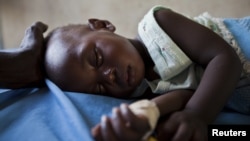A new study shows that widely distributing anti-malaria drugs to healthy children in African countries can significantly reduce the number of new cases of the disease.
The medical aid group Doctors Without Borders says it gave intermittent doses of anti-malaria drugs to 175,000 children in Mali and Chad. It says the result was a 67 percent decrease in the number of simple malaria cases in the region of Mali where the study took place, and up to an 86 percent drop in Chad.
Doctors Without Borders says there also was a significant decrease in the number of cases of severe malaria.
The study was launched in July and will continue through next month, a period of high transmission for malaria. Children between three months and five years were given a dose of anti-malaria drugs (amodiaquine and one of sulphadoxine or pryrimethamine) over a three-day period once a month.
The World Health Organization estimates that 650,000 people die from malaria each year. It says 90 percent of the cases occur in sub-Saharan Africa, mainly among young children.
The medical aid group Doctors Without Borders says it gave intermittent doses of anti-malaria drugs to 175,000 children in Mali and Chad. It says the result was a 67 percent decrease in the number of simple malaria cases in the region of Mali where the study took place, and up to an 86 percent drop in Chad.
Doctors Without Borders says there also was a significant decrease in the number of cases of severe malaria.
The study was launched in July and will continue through next month, a period of high transmission for malaria. Children between three months and five years were given a dose of anti-malaria drugs (amodiaquine and one of sulphadoxine or pryrimethamine) over a three-day period once a month.
The World Health Organization estimates that 650,000 people die from malaria each year. It says 90 percent of the cases occur in sub-Saharan Africa, mainly among young children.





